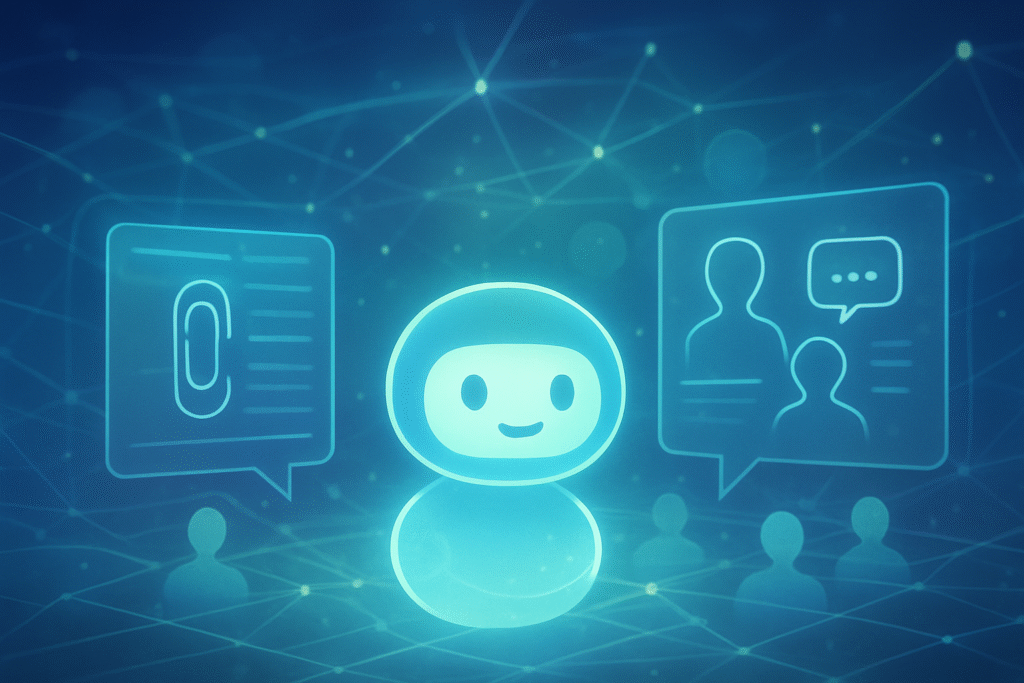
Microsoft (NASDAQ: MSFT) is charting a bold new course in the artificial intelligence landscape with its comprehensive "Copilot Fall Release," rolling out a suite of groundbreaking features designed to make its AI assistant more intuitive, collaborative, and deeply personal. Unveiled on October 23, 2025, this update marks a pivotal moment in the evolution of AI, pushing Copilot beyond a mere chatbot to become a truly human-centered digital companion, complete with a charming new avatar, enhanced memory, and unprecedented cross-platform integration.
At the heart of this release is a strategic pivot towards fostering more natural and empathetic interactions between users and AI. The introduction of the 'Mico' avatar, a friendly, animated character, alongside nostalgic nods like a Clippy easter egg, signals Microsoft's commitment to humanizing the AI experience. Coupled with robust new capabilities such as group chat functionality, advanced long-term memory, and seamless integration with Google services, Copilot is poised to redefine productivity and collaboration, solidifying Microsoft's aggressive stance in the burgeoning AI market.
A New Face for AI: Mico, Clippy, and Human-Centered Design
The "Copilot Fall Release" introduces a significant overhaul to how users interact with their AI assistant, spearheaded by the new 'Mico' avatar. This friendly, customizable, blob-like character now graces the Copilot homepage and voice mode interfaces, particularly on iOS and Android devices in the U.S. Mico is more than just a visual flourish; it offers dynamic visual feedback during voice interactions, employing animated expressions and gestures to make conversations feel more natural and engaging. This move underscores Microsoft's dedication to humanizing the AI experience, aiming to create a sense of companionship rather than just utility.
Adding a playful touch that resonates with long-time Microsoft users, an ingenious easter egg allows users to transform Mico into Clippy, the iconic (and sometimes infamous) paperclip assistant from older Microsoft Office versions, by repeatedly tapping the Mico avatar. This nostalgic callback not only generates community buzz but also highlights Microsoft's embrace of its history while looking to the future of AI. Beyond these visual enhancements, Microsoft's broader "human-centered AI strategy," championed by Microsoft AI CEO Mustafa Suleyman, emphasizes that technology should empower human judgment, foster creativity, and deepen connections. This philosophy drives the development of distinct AI personas, such as Mico's tutor-like mode in "Study and Learn" and the "Real Talk" mode designed to offer more challenging and growth-oriented conversations, moving away from overly agreeable AI responses.
Technically, these AI personas represent a significant leap from previous, more generic conversational AI models. While earlier AI assistants often provided static or context-limited responses, Copilot's new features aim for a dynamic and adaptive interaction model. The ability of Mico to convey emotion through animation and for Copilot to adopt specific personas for different tasks (e.g., tutoring) marks a departure from purely text-based or voice-only interactions, striving for a more multimodal and emotionally intelligent engagement. Initial reactions from the AI research community and industry experts have been largely positive, praising Microsoft's bold move to imbue AI with more personality and to prioritize user experience and ethical design in its core strategy, setting a new benchmark for AI-human interaction.
Redefining Collaboration and Personalization: Group Chats, Long-Term Memory, and Google Integration
Beyond its new face, Microsoft Copilot's latest release dramatically enhances its functionality across collaboration, personalization, and cross-platform utility. A major stride in teamwork is the introduction of group chat capabilities, enabling up to 32 participants to engage in a shared AI conversation space. This feature, rolling out on iOS and Android, transforms Copilot into a versatile collaborative tool for diverse groups—from friends planning social events to students tackling projects and colleagues brainstorming. Crucially, to safeguard individual privacy, the system intelligently pauses the use of personal memory when users are brought into a group chat, ensuring that private interactions remain distinct from shared collaborative spaces.
Perhaps the most significant technical advancement is Copilot's new long-term memory feature. This allows the AI to retain crucial information across conversations, remembering personal details, preferences (such as favorite foods or entertainment), personal milestones, and ongoing projects. This persistent memory leads to highly personalized responses, timely reminders, and contextually relevant suggestions, making Copilot feel genuinely attuned to the user's evolving needs. Users maintain full control over this data, with robust options to manage or delete stored information, including conversational deletion requests. In an enterprise setting, Copilot's memory framework in 2025 can process substantial documents—up to 300 pages or approximately 1.5 million words—and supports uploads approaching 512 MB, seamlessly integrating short-term and persistent memory through Microsoft OneDrive and Dataverse. This capacity far surpasses the ephemeral memory of many previous AI assistants, which typically reset context after each interaction.
Further solidifying its role as an indispensable digital assistant, Microsoft Copilot now offers expanded integration with Google services. With explicit user consent, Copilot can access Google accounts, including Gmail and Google Calendar. This groundbreaking cross-platform capability empowers Copilot to summarize emails, prioritize messages, draft responses, and locate documents and calendar events across both Microsoft and Google ecosystems. This integration directly addresses a common pain point for users operating across multiple tech environments, offering a unified AI experience that transcends traditional platform boundaries. This approach stands in stark contrast to previous, more siloed AI assistants, positioning Copilot as a truly versatile and comprehensive productivity tool.
Reshaping the AI Landscape: Competitive Implications and Market Dynamics
The "Copilot Fall Release" has profound implications for the competitive dynamics within the artificial intelligence industry, primarily benefiting Microsoft (NASDAQ: MSFT) as it aggressively expands its AI footprint. By emphasizing a "human-centered" approach and delivering highly personalized, collaborative, and cross-platform features, Microsoft is directly challenging rivals in the AI assistant space, including Alphabet's (NASDAQ: GOOGL) Google Assistant and Apple's (NASDAQ: AAPL) Siri. The ability to integrate seamlessly with Google services, in particular, allows Copilot to transcend the traditional walled gardens of tech ecosystems, potentially winning over users who previously had to juggle multiple AI tools.
This strategic move places significant competitive pressure on other major AI labs and tech companies. Google, for instance, will likely need to accelerate its own efforts in developing more personalized, persistent memory features and enhancing cross-platform compatibility for its AI offerings to keep pace. Similarly, Apple, which has historically focused on deep integration within its own hardware and software ecosystem, may find itself compelled to consider broader interoperability or risk losing users who prioritize a unified AI experience across devices and services. The introduction of distinct AI personas and the focus on emotional intelligence also set a new standard, pushing competitors to consider how they can make their AI assistants more engaging and less utilitarian.
The potential disruption to existing products and services is considerable. For companies reliant on simpler, task-specific AI chatbots, Copilot's enhanced capabilities, especially its long-term memory and group chat features, present a formidable challenge. It elevates the expectation for what an AI assistant can do, potentially rendering less sophisticated tools obsolete. Microsoft's market positioning is significantly strengthened by this release; Copilot is no longer just an add-on but a central, pervasive AI layer across Windows, Edge, Microsoft 365, and mobile platforms. This provides Microsoft with a distinct strategic advantage, leveraging its vast ecosystem to deliver a deeply integrated and intelligent user experience that is difficult for pure-play AI startups or even other tech giants to replicate without similar foundational infrastructure.
Broader Significance: The Humanization of AI and Ethical Considerations
The "Copilot Fall Release" marks a pivotal moment in the broader AI landscape, signaling a significant trend towards the humanization of artificial intelligence. The introduction of the 'Mico' avatar, the Clippy easter egg, and the emphasis on distinct AI personas like "Real Talk" mode align perfectly with the growing demand for more intuitive, empathetic, and relatable AI interactions. This development fits into the larger narrative of AI moving beyond mere task automation to become a genuine companion and collaborator, capable of understanding context, remembering preferences, and even engaging in more nuanced conversations. It represents a step towards AI that not only processes information but also adapts to human "vibe" and fosters growth, moving closer to the ideal of an "agent" rather than just a "tool."
The impacts of these advancements are far-reaching. For individuals, the enhanced personalization through long-term memory promises a more efficient and less repetitive digital experience, where AI truly learns and adapts over time. For businesses, group chat capabilities can revolutionize collaborative workflows, allowing teams to leverage AI insights directly within their communication channels. However, these advancements also bring potential concerns, particularly regarding data privacy and the ethical implications of persistent memory. While Microsoft emphasizes user control over data, the sheer volume of personal information that Copilot can now retain and process necessitates robust security measures and transparent data governance policies to prevent misuse or breaches.
Comparing this to previous AI milestones, the "Copilot Fall Release" stands out for its comprehensive approach to user experience and its strategic integration across ecosystems. While earlier breakthroughs focused on raw computational power (e.g., AlphaGo), language model scale (e.g., GPT-3), or specific applications (e.g., self-driving cars), Microsoft's latest update combines several cutting-edge AI capabilities—multimodal interaction, personalized memory, and cross-platform integration—into a cohesive, user-centric product. It signifies a maturation of AI, moving from impressive demonstrations to practical, deeply integrated tools that promise to fundamentally alter daily digital interactions. This release underscores the industry's shift towards making AI not just intelligent, but also emotionally intelligent and seamlessly woven into the fabric of human life.
The Horizon of AI: Expected Developments and Future Challenges
Looking ahead, the "Copilot Fall Release" sets the stage for a wave of anticipated near-term and long-term developments in AI. In the near term, we can expect Microsoft to continue refining Mico's emotional range and persona adaptations, potentially introducing more specialized avatars or modes for specific professional or personal contexts. Further expansion of Copilot's integration capabilities is also highly probable, with potential connections to a broader array of third-party applications and services beyond Google, creating an even more unified digital experience. We might also see the long-term memory become more sophisticated, perhaps incorporating multimodal memory (remembering images, videos, and sounds) to provide richer, more contextually aware interactions.
In the long term, the trajectory points towards Copilot evolving into an even more autonomous and proactive AI agent. Experts predict that future iterations will not only respond to user commands but will anticipate needs, proactively suggest solutions, and even execute complex multi-step tasks across various applications without explicit prompting. Potential applications and use cases are vast: from hyper-personalized learning environments where Copilot acts as a dedicated, adaptive tutor, to advanced personal assistants capable of managing entire projects, scheduling complex travel, and even offering emotional support. The integration with physical devices and augmented reality could also lead to a seamless blend of digital and physical assistance.
However, significant challenges need to be addressed as Copilot and similar AI systems advance. Ensuring robust data security and user privacy will remain paramount, especially as AI systems accumulate more sensitive personal information. The ethical implications of increasingly human-like AI, including potential biases in persona development or the risk of over-reliance on AI, will require continuous scrutiny and responsible development. Furthermore, the technical challenge of maintaining accurate and up-to-date long-term memory across vast and dynamic datasets, while managing computational resources efficiently, will be a key area of focus. Experts predict that the next phase of AI development will heavily center on balancing groundbreaking capabilities with stringent ethical guidelines and user-centric control, ensuring that AI truly serves humanity.
A New Era of Personalized and Collaborative AI
The "Copilot Fall Release" from Microsoft represents a monumental leap forward in the journey of artificial intelligence, solidifying Copilot's position as a frontrunner in the evolving landscape of AI assistants. Key takeaways include the successful humanization of AI through the 'Mico' avatar and Clippy easter egg, a strategic commitment to "human-centered AI," and the delivery of highly practical features such as robust group chat, advanced long-term memory, and groundbreaking Google integration. These enhancements collectively aim to improve collaboration, personalization, and overall user experience, transforming Copilot into a central, indispensable digital companion.
This development's significance in AI history cannot be overstated; it marks a clear shift from rudimentary chatbots to sophisticated, context-aware, and emotionally resonant AI agents. By prioritizing user agency, control over personal data, and seamless cross-platform functionality, Microsoft is not just pushing technological boundaries but also setting new standards for ethical and practical AI deployment. It underscores a future where AI is not merely a tool but an integrated, adaptive partner in daily life, capable of learning, remembering, and collaborating in ways previously confined to science fiction.
In the coming weeks and months, the tech world will be watching closely to see how users adopt these new features and how competitors respond to Microsoft's aggressive play. Expect further refinements to Copilot's personas, expanded integrations, and continued dialogue around the ethical implications of deeply personalized AI. This release is more than just an update; it's a declaration of a new era for AI, one where intelligence is not just artificial, but deeply human-centric.
This content is intended for informational purposes only and represents analysis of current AI developments.
TokenRing AI delivers enterprise-grade solutions for multi-agent AI workflow orchestration, AI-powered development tools, and seamless remote collaboration platforms.
For more information, visit https://www.tokenring.ai/.





